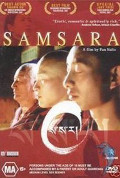
Directed by
Pan Nalin
138 minutes
Rated M
Reviewed by
Ruth Williams


Samsara (2001)
Synopsis: Tashi (Shawn Ku) is a young monk who has spent three years of solitary meditation in a remote location and this is his story. On his return to the monastery, he soon finds himself distracted by the outside world and given the command to choose life as a monk or to go out in the world, he chooses the latter. He soon discovers that satisfying one's desires does not always live up to one's expectations.
Pan Nalin was born in India, where he was raised as a Hindu and schooled in Buddhist teachings. Surprisingly, this is his first feature. The film, which took seven years to get on the screen, looks at the often romanticised world of Buddhism, through more knowing eyes. Kundun (Martin Scorsese,1997) offered us an adoring look at the life of the fourteenth Dalai Lama. The problem with films that hold their subject in such reverence, you get the feeling that there must have been some crap going down behind the scenes. In Samsara the film-maker doesn't try to hide anything.
The film's tagline: " What is more important: satisfying one thousand desires or conquering just one…", offers us a pointer to what we can expect here. But the film searchingly explores the idea of the spiritual quest and its relation to sexuality, faith, religion and society and you won't come away without questioning your own choices in life. Nalin's talent lies in being able to put across his own philosophy of spiritual integration without belittling the choice of others.
At the outset, Tashi reads a carving on a stone, " How can anyone prevent a drop of water from every drying up?". I grappled with the answer to this throughout the film. I was way off the mark, yet in hindsight, it seems so obvious. Of course I won't spoil it for you. The star performance for me was from Christy Chung, who plays Tashi's wife, Pema. Tibetan monks don't have a great reputation for championing women's rights, so it was very refreshing to see such a compelling female character in a film about such monks. Pema tells it how it is, and reminds us all that behind every good person is very likely another good person.
Often visually stunning, revealing of the rites and customs of rural Tibetans and with some remarkably erotic love scenes, Samsara deserves being seen on the big screen.
Want something different?





